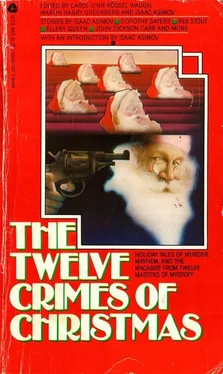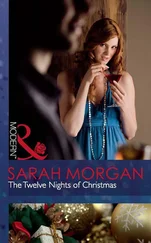Carol-Lynn Waugh - The Twelve Crimes of Christmas
Здесь есть возможность читать онлайн «Carol-Lynn Waugh - The Twelve Crimes of Christmas» весь текст электронной книги совершенно бесплатно (целиком полную версию без сокращений). В некоторых случаях можно слушать аудио, скачать через торрент в формате fb2 и присутствует краткое содержание. Жанр: Триллер, на английском языке. Описание произведения, (предисловие) а так же отзывы посетителей доступны на портале библиотеки ЛибКат.
- Название:The Twelve Crimes of Christmas
- Автор:
- Жанр:
- Год:неизвестен
- ISBN:нет данных
- Рейтинг книги:3 / 5. Голосов: 1
-
Избранное:Добавить в избранное
- Отзывы:
-
Ваша оценка:
- 60
- 1
- 2
- 3
- 4
- 5
The Twelve Crimes of Christmas: краткое содержание, описание и аннотация
Предлагаем к чтению аннотацию, описание, краткое содержание или предисловие (зависит от того, что написал сам автор книги «The Twelve Crimes of Christmas»). Если вы не нашли необходимую информацию о книге — напишите в комментариях, мы постараемся отыскать её.
The Twelve Crimes of Christmas — читать онлайн бесплатно полную книгу (весь текст) целиком
Ниже представлен текст книги, разбитый по страницам. Система сохранения места последней прочитанной страницы, позволяет с удобством читать онлайн бесплатно книгу «The Twelve Crimes of Christmas», без необходимости каждый раз заново искать на чём Вы остановились. Поставьте закладку, и сможете в любой момент перейти на страницу, на которой закончили чтение.
Интервал:
Закладка:
Dinner was over-a seemingly endless succession of soup, fish, turkey, roast beef, plum pudding, mince pies, crystallized fruit, nuts, and five kinds of wine, presided over by Sir Septimus, all smiles, by Lady Shale, all mocking deprecation, and by Margharita, pretty and bored, with the necklace of twenty-one pearls gleaming softly on her slender throat. Gorged and dyspeptic and longing only for the horizontal position, the company had been shepherded into the drawing room and set to play “Musical Chairs” (Miss Tomkins at the piano), “Hunt the Slipper” (slipper provided by Miss Tomkins), and “Dumb Crambo” (costumes by Miss Tomkins and Mr. William Norgate). The back drawing room (for Sir Septimus clung to these old-fashioned names) provided an admirable dressing room, being screened by folding doors from the large drawing room, in which the audience sat on aluminum chairs, scrabbling uneasy toes on a floor of black glass under the tremendous illumination of electricity reflected from a brass ceiling.
It was William Norgate who, after taking the temperature of the meeting, suggested to Lady Shale that they should play at something less athletic. Lady Shale agreed and, as usual, suggested bridge. Sir Septimus, as usual, blew the suggestion aside.
“Bridge? Nonsense! Nonsense! Play bridge every day of your lives. This is Christmastime. Something we can all play together. How about ‘Animal, Vegetable, and Mineral’?”
This intellectual pastime was a favorite with Sir Septimus; he was rather good at putting pregnant questions. After a brief discussion, it became evident that this game was an inevitable part of the program. The party settled down to it, Sir Septimus undertaking to “go out” first and set the thing going.
Presently they had guessed, among other things, Miss Tomkin’s mother’s photograph, a gramophone record of “I want to be happy” (much scientific research into the exact composition of records, settled by William Norgate out of the Encyclopaedia Britannica ), the smallest stickleback in the stream at the bottom of the garden, the new planet, Pluto, the scarf, worn by Mrs. Dennison (very confusing, because it was not silk, which would be animal, or artificial silk, which would be vegetable, but made of spun glass-mineral, a very clever choice of subject), and had failed to guess the Prime Minister’s wireless speech-which was voted not fair, since nobody could decide whether it was animal by nature or a kind of gas. It was decided that they should do one more word and then go on to “Hide-and-Seek.” Oswald Truegood had retired into the back room and shut the door behind him while the party discussed the next subject of examination, when suddenly Sir Septimus broke in on the argument by calling to ids daughter:
“Hullo, Margy! What have you done with your necklace?”
“I took it off, Dad, because I thought it might get broken in ‘Dumb Crambo.’ It’s over here on this table. No, it isn’t. Did you take it, mother?”
“No, I didn’t. If I’d seen it, I should have. You are a careless child.”
“I believe you’ve got it yourself, Dad. You’re teasing.”
Sir Septimus denied the accusation with some energy. Everybody got up and began to hunt about. There were not many places in that bare and polished room where a necklace could be hidden. After ten minutes’ fruitless investigation, Richard Dennison, who had been seated next to the table where the pearls had been placed, began to look rather uncomfortable.
“Awkward, you know,” he remarked to Wimsey.
At this moment, Oswald Truegood put his head through the folding doors and asked whether they hadn’t settled on something by now, because he was getting the fidgets.
This directed the attention of the searchers to the inner room. Margharita must have been mistaken. She had taken it in there, and it had got mixed up with the dressing-up clothes somehow. The room was ransacked. Everything was lifted up and shaken. The thing began to look serious. After half an hour of desperate energy it became apparent that the pearls were nowhere to be found.
“They must be somewhere in these two rooms, you know,” said Wimsey. “The back drawing room has no door, and nobody could have gone out of the front drawing room without being seen. Unless the windows-”
No. The windows were all guarded on the outside by heavy shutters which it needed two footmen to take down and replace. The pearls had not gone out that way. In fact, the mere suggestion that they had left the drawing room at all was disagreeable. Because-because-
It was William Norgate, efficient as ever, who coldly and boldly faced the issue.
“I think, Sir Septimus, it would be a relief to the minds of everybody present if we could all be searched.”
Sir Septimus was horrified, but the guests, having found a leader, backed up Norgate. The door was locked, and the search was conducted-the ladies in the inner room and the men in the outer.
Nothing resulted from it except some very interesting information about the belongings habitually carried about by the average man and woman. It was natural that Lord Peter Wimsey should possess a pair of forceps, a pocket lens, and a small folding foot rule-was he not a Sherlock Holmes in high life? But that Oswald Truegood should have two liver pills in a screw of paper and Henry Shale a pocket edition of The Odes of Horace was unexpected. Why did John Shale distend the pockets of his dress suit with a stump of red sealing wax, an ugly little mascot, and a five-shilling piece? George Comphrey had a pair of folding scissors and three wrapped lumps of sugar, of the sort served in restaurants and dining cars-evidence of a not uncommon form of kleptomania; but that the tidy and exact Norgate should burden himself with a reel of white cotton, three separate lengths of string, and twelve safety pins on a card seemed really remarkable till one remembered that he had superintended all the Christmas decorations. Richard Dennison, amid some confusion and laughter, was found to cherish a lady’s garter, a powder compact, and half a potato; the last-named, he said, was a prophylactic against rheumatism (to which he was subject), while the other objects belonged to his wife. On the ladies’ side, the more striking exhibits were a little book on palmistry, three invisible hairpins, and a baby’s photograph (Miss Tomkins); a Chinese trick cigarette-case with a secret compartment (Beryl Dennison); a very private letter and an outfit for mending stocking runs (Lavinia Prescott); and a pair of eyebrow tweezers and a small packet of white powder, said to be for headaches (Betty Shale). An agitating moment followed the production from Joyce Trivett’s handbag of a small string of pearls-but it was promptly remembered that these had come out of one of the crackers at dinner time, and they were, in fact, synthetic. In short, the search was unproductive of anything beyond a general shamefacedness and the discomfort always produced by undressing and redressing in a hurry at the wrong time of the day.
It was then that somebody, very grudgingly and haltingly, mentioned the horrid word “Police.” Sir Septimus, naturally, was appalled by the idea. It was disgusting. He would not allow it. The pearls must be somewhere. They must search the rooms again. Could not Lord Peter Wimsey, with his experience of-er-mysterious happenings, do something to assist them?
“Eh?” said his lordship. “Oh, by Jove, yes-by all means, certainly. That is to say, provided nobody supposes-eh, what? I mean to say, you don’t know that I’m not a suspicious character, do you, what?”
Lady Shale interposed with authority.
“We don’t think anybody ought to be suspected,” she said, “but, if we did, we’d know it couldn’t be you. You know far too much about crimes to want to commit one.”
Читать дальшеИнтервал:
Закладка:
Похожие книги на «The Twelve Crimes of Christmas»
Представляем Вашему вниманию похожие книги на «The Twelve Crimes of Christmas» списком для выбора. Мы отобрали схожую по названию и смыслу литературу в надежде предоставить читателям больше вариантов отыскать новые, интересные, ещё непрочитанные произведения.
Обсуждение, отзывы о книге «The Twelve Crimes of Christmas» и просто собственные мнения читателей. Оставьте ваши комментарии, напишите, что Вы думаете о произведении, его смысле или главных героях. Укажите что конкретно понравилось, а что нет, и почему Вы так считаете.












